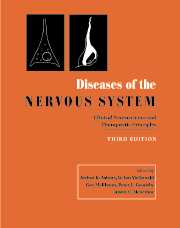Book contents
- Frontmatter
- Dedication
- Contents
- List of contributors
- Editor's preface
- PART I INTRODUCTION AND GENERAL PRINCIPLES
- PART II DISORDERS OF HIGHER FUNCTION
- 13 Congenital disorders of cerebral cortical development
- 14 The aging brain: morphology, imaging and function
- 15 Neurodegenerative diseases
- 16 Aging and dementia: principles, evaluation and diagnosis
- 17 Alzheimer's Disease
- 18 Dementia with Lewy bodies
- 19 Frontotemporal dementia
- 20 Consciousness and its disorders
- 21 Mechanisms of memory and amnestic syndromes
- 22 Acquired disorders of language
- 23 Neglect
- 24 Brain death
- 25 Disorders of mood
- 26 Schizophrenia
- 27 Obsessive–compulsive disorder
- 28 Autism and autistic spectrum disorders
- 29 Attention deficit hyperactivity disorder: spectrum and mechanisms
- 30 The neurobiology of drug addition
- PART III DISORDERS OF MOTOR CONTROL
- PART IV DISORDERS OF THE SPECIAL SENSES
- PART V DISORDERS OF SPINE AND SPINAL CORD
- PART VI DISORDERS OF BODY FUNCTION
- PART VII HEADACHE AND PAIN
- PART VIII NEUROMUSCULAR DISORDERS
- PART IX EPILEPSY
- PART X CEREBROVASCULAR DISORDERS
- PART XI NEOPLASTIC DISORDERS
- PART XII AUTOIMMUNE DISORDERS
- PART XIII DISORDERS OF MYELIN
- PART XIV INFECTIONS
- PART XV TRAUMA AND TOXIC DISORDERS
- PART XVI DEGENERATIVE DISORDERS
- PART XVII NEUROLOGICAL MANIFESTATIONS OF SYSTEMIC CONDITIONS
- Complete two-volume index
- Plate Section
26 - Schizophrenia
from PART II - DISORDERS OF HIGHER FUNCTION
Published online by Cambridge University Press: 05 August 2016
- Frontmatter
- Dedication
- Contents
- List of contributors
- Editor's preface
- PART I INTRODUCTION AND GENERAL PRINCIPLES
- PART II DISORDERS OF HIGHER FUNCTION
- 13 Congenital disorders of cerebral cortical development
- 14 The aging brain: morphology, imaging and function
- 15 Neurodegenerative diseases
- 16 Aging and dementia: principles, evaluation and diagnosis
- 17 Alzheimer's Disease
- 18 Dementia with Lewy bodies
- 19 Frontotemporal dementia
- 20 Consciousness and its disorders
- 21 Mechanisms of memory and amnestic syndromes
- 22 Acquired disorders of language
- 23 Neglect
- 24 Brain death
- 25 Disorders of mood
- 26 Schizophrenia
- 27 Obsessive–compulsive disorder
- 28 Autism and autistic spectrum disorders
- 29 Attention deficit hyperactivity disorder: spectrum and mechanisms
- 30 The neurobiology of drug addition
- PART III DISORDERS OF MOTOR CONTROL
- PART IV DISORDERS OF THE SPECIAL SENSES
- PART V DISORDERS OF SPINE AND SPINAL CORD
- PART VI DISORDERS OF BODY FUNCTION
- PART VII HEADACHE AND PAIN
- PART VIII NEUROMUSCULAR DISORDERS
- PART IX EPILEPSY
- PART X CEREBROVASCULAR DISORDERS
- PART XI NEOPLASTIC DISORDERS
- PART XII AUTOIMMUNE DISORDERS
- PART XIII DISORDERS OF MYELIN
- PART XIV INFECTIONS
- PART XV TRAUMA AND TOXIC DISORDERS
- PART XVI DEGENERATIVE DISORDERS
- PART XVII NEUROLOGICAL MANIFESTATIONS OF SYSTEMIC CONDITIONS
- Complete two-volume index
- Plate Section
Summary
Although not the commonest psychiatric disorder, schizophrenia is at the heart of psychiatry. It is also the disorder which has caused most controversy in terms of its nature, its treatment, even its very existence. One particular debate has concerned its organic basis and, indirectly, the extent to which it is a disorder of brain or of mind. As such, schizophrenia, like epilepsy, has exemplified both the bridge and the gulf between neurology and psychiatry. When Kraepelin described the syndrome at the end of the nineteenth century, he persuaded his young colleague Alzheimer to investigate its neuropathology. However, no substantive progress was made and by the middle of the twentieth century the pendulum had swung almost entirely to psychological and sociological views of schizophrenia. The pendulum has swung back over the past 25 years, with convincing evidence of differences in the structure and function of the brain of patients with schizophrenia finally emerging.
Clinical features and epidemiology
Schizophrenia remains a clinical diagnosis, based upon the presence of certain types of delusions and hallucinations (sometimes grouped together as ‘first rank symptoms’) and thought disorder (Andreasen, 1995). These ‘positive’ symptoms are often complemented by the ‘negative’ symptoms of avolition, alogia and affective flattening. The criteria of the Diagnostic and Statistical Manual of Mental Disorders (4th edition) (DSM-IV; American Psychiatric Association, 1994) are used for most research studies (Table 26.1); the World Health Organization ICD-10 criteria are similar but require only a 1-month duration. Depending on the balance of symptoms, different subsyndromes are classically recognized: paranoid, hebephrenic (disorganized), catatonic, undifferentiated and simple subtypes. A final clinical domain, neglected until recently, is that there are neuropsychological deficits, with impaired performance across a wide range of memory and language tasks apparent in first episode patients (Bilder et al., 2000) as well as in most long-standing cases (Palmer et al., 1997). Interest in this aspect of schizophrenia has increased with recognition that the cognitive impairments may be a major contributor to poor outcome (Green, 1996).
Schizophrenia can begin at any time from early childhood onwards, with a peak age of onset in the third decade, occurring a few years earlier in men than women. The course and outcome are remarkably variable and unpredictable, but the prognosis is better than sometimes believed.
- Type
- Chapter
- Information
- Diseases of the Nervous SystemClinical Neuroscience and Therapeutic Principles, pp. 374 - 384Publisher: Cambridge University PressPrint publication year: 2002



